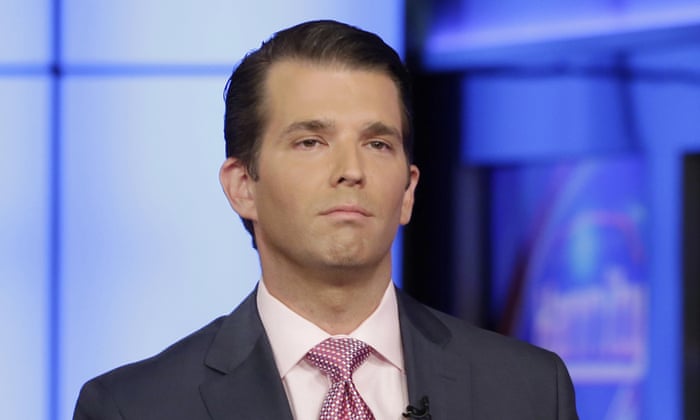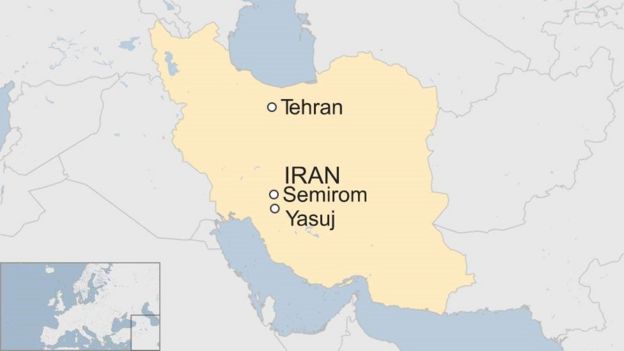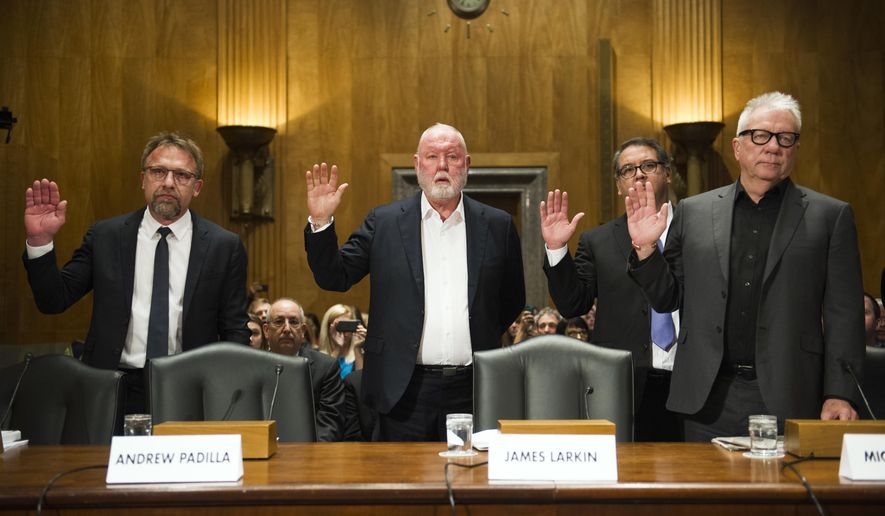Good morning, Q-MHI readers!
WHAT TO WATCH FOR TODAY

Donald Trump Jr.’s controversial India trip. The president’s son alarmed ethics watchdogs with front-page ads in three major Indian newspapers offering dinner with Don Jr. to anyone who buys an apartment in a Trump-branded property before Feb. 20. He’ll attend a business summit with prime minister Narendra Modi later in the week.A similar arrangement promoted by the developers, Tribeca and M3M, to fly buyers to New York to meet Trump Jr was described by the former Obama corruption watchdog, Norman L Eisen, as an “ethics atrocity”.
“Access to the first family should not be for sale,” Eisen said last month. “It’s particularly inappropriate because we know he is in constant communication with his father, so it does create a conduit to attempt to influence the president and one of his closest confidants and family members.”

Donald Trump ceded control of the organisation to his sons before his inauguration in January 2017, an arrangement ethics lawyers said would not eliminate conflicts of interest between policy decisions and his family’s finances.In an interview with the New York Times last week, Trump Jr said he had spent nearly a decade “cultivating relationships in India” and his company was “now seeing the response of that effort”.He denied he would use any meetings with government ministers or officials to push for concessions for Trump-branded projects in India. “We certainly won’t get involved in that,” he said.
He is the second of the US president’s children to visit the country since his inauguration. Ivanka, Trump’s eldest daughter, visited Hyderabad in November to speak at an entrepreneurship summit in her capacity as a presidential adviser.

Europe’s financial future. European finance ministers meet in Brussels today to discuss the economy, pick a candidate for European Central Bank vice president, and assess Greek debt relief following a bond offering earlier this month.
US markets are closed Feb. 19 for the President’s Day holiday.
NEWS FROM OVER THE WEEKEND





Donald Trump raged over Russia indictments. In a series of angry tweets, the president blamed his predecessor Barack Obama for not stopping Russian interference. He also lined up with a Facebook executive to give a misleading account of special counsel Robert Mueller’s indictments.


US students demanded gun controls. Survivors of the shooting that killed 17 at a Florida high school last week called for new restrictions on gun purchases and a national march on Washington next month. The students also slammed Trump for his tweet blaming the FBI’s failure to follow up on a report about the school shooter on the fact it was too busy focusing on Russia.



Benjamin Netanyahu brought wreckage to the Munich Security Conference. The Israeli prime minister brandished a piece of debris, saying it came from an Iranian drone shot down in Israel. He likened the 2015 Iran nuclear deal to the 1938 Munich agreement with Nazi Germany. It’s not the first time Netanyahu and others have used props.





An Iranian plane crash likely killed all 66 people on board.Rescuers struggled to reach the wreckage of a domestic flight operated by Aseman Airlines amid fog and heavy snow. Iran has suffered numerous plane crashes over the years, with international sanctions limiting access to replacement parts.

A Russian curler was charged with doping at the Winter Olympics. Alexander Krushnelnitsky tested positive for the banned substance meldonium and will probably be stripped of his bronze medal. He said he suspects his drink was spiked by a team-mate. Despite Russia’s state-sponsored doping during the Sochi Olympics, 168 Russian athletes have been allowed to compete in Pyeongchang.
Q-MHI OBSESSION INTERLUDE






Preeti Varathan on why white people should watch Black Panther. “Black Panther has an almost entirely black cast and a black director. That’s a gift for black girls and boys everywhere who aren’t used to seeing themselves onscreen—and it’s a gift for non-black people, too… actively encouraging children’s admiration for a person of a different race or identity group, in a respectful way, helps them to thoughtfully respond to and empathize with others.”
MATTERS OF DEBATE

Live podcast recordings ruin everything that makes podcasts great. They make listening jarring instead of calming, and disrupt quiet moments with grating applause.

Black Panther isn’t radical at all. The Marvel blockbuster devalues black American men.Black Panther, the most recent entry into the Marvel cinematic universe, has been greeted with the breathless anticipation that its arrival will Change Things. The movie features the leader of a fictional African country who has enough wealth to make Warren Buffet feel like a financial piker and enough technological capacity to rival advanced alien races.

The change that the movie supposedly heralds is black empowerment to effectively challenge racist narratives. This is a tall order, especially in the time of Trump, who insists that blacks live in hell and wishes that (black) sons of bitches would get fired for protesting police violence. Which makes it a real shame that Black Panther, a movie unique for its black star power and its many thoughtful portrayals of strong black women, depends on a shocking devaluation of black American men.

Wakanda is a fictional nation in Africa, a marvel beyond all marvels. Its stupendous wealth and technological advancement reaches beyond anything the folks in MIT’s labs could dream of. The source of all this wonder is vibranium, a substance miraculous in ways that the movie does not bother to explain.

But so far as we understand, it is a potent energy source as well as an unmatched raw material. A meteor rich in vibranium, which crashed ages ago into the land that would become Wakanda, made Wakanda so powerful that the terrors of colonialism and imperialism passed it by.

Using technology to hide its good fortune, the country plays the part of a poor, third-world African nation. In reality, it thrives, and its isolationist policies protect it from anti-black racism.

Delaware should be the first target in the fight against human trafficking. The tiny state’s corporate secrecy laws make it almost impossible to find out who profits from selling sex workers. Backpage.com is the world’s second-biggest classified advertising website. It is also the world’s “top online brothel” and a hotbed of human trafficking, according to US law enforcement.

In the US, the website is involved in seven out of ten reported child trafficking cases. In California alone, 2,900 suspected cases of child-trafficking were linked to the site between 2012 and 2016. There are several open lawsuits against Backpage.com, including one by the California attorney general’s office for 26 counts including money laundering, but US law law enforcement officials have so far failed to shut it down.

Delaware, which has 1.3 million businesses and less than one million people, is beloved of nefarious businesses. While a lot of firms flock to the state for its low corporate tax rates, a Senate investigation found that Backpage picked Delaware for another reason: secrecy. Delaware law allows companies’ owners to hide their true identity. This makes it very difficult to crack down on criminals who launder money through them.


In Backpage’s case, company founders Michael Lacey and James Larkin apparently tried to make it seem like they’d sold the firm by setting up a complex web of international and American shell companies, starting in Delaware.

In reality, they loaned $600 million to the company’s CEO Carl Ferrer to make it seem as if he had bought it from them, while they continued to control the company and receive large bonuses from it.

Lacey and Larkin were still the company’s beneficial owners, alongside Ferrer, the Senate Subcommittee on Investigations revealed after subpoenaing company information for its 2017 report. It’s unclear exactly why Lacey and Larkin wanted to distance themselves from the company, but people often do so to avoid criminal liability.
This is far from an isolated case. A report by anti-slavery NGO Polaris published last month , anonymous shell companies were a “staple” of firms trafficking women through US massage parlors, a $2.5 billion industry. It named Delaware, Nevada, and Wyoming as the three most notorious states for corporate secrecy.
Secrecy laws mean that even law enforcement can’t readily find out who actually owns many US companies. To unearth the owner of one company, investigators have to go through a lengthy subpoena application process, which will often then lead to another anonymous company, and so on.

Bipartisan bills in the House and Senate aim to tackle the issue by forcing companies to add their owners’ names to a registry accessible to law enforcement, but are currently sitting ignored in Congress. Only one hearing on the bills has been held since their introduction last summer.
SURPRISING DISCOVERIES


Olympic curlers are being rebranded as sexy. Once seen as the paunchy couch potatoes of the sporting world, male curlers are flexing their guns (paywall) in a racy calendar.

Cameroon’s president-for-life has spent 15% of his time in office abroad. Paul Biya’s mysterious foreign trips took up over five of his 35 years as president, many of them to a five-star Geneva hotel.


China wants the US to punish a thumb thief. The 24-year-old American snapped a thumb off an ancient terracotta warrior statue on loan to a US museum.Cultural centre that arranged loan of 10 ancient soldiers also seeking compensation from the Franklin Institute.

The 10 statues, which have been on show in Philadelphia since September, are part of a clay army of about 8,000 soldiers, charioteers and horses unearthed in Xian, capital of northwestern China’s Shaanxi province.Found in the tomb of China’s first emperor Qin Shihuang and designed to accompany him into the afterlife, the statues date back to 210-209BC and, according to figures from the FBI, are worth US$4.5 million apiece.

Flatulence forced an emergency landing. A Transavia flight was forced to land and summon the police when a passenger’s gassiness led to an onboard fight.

Apple sold more watches than Switzerland. In the final quarter of 2017, the tech company sold 8 million watches, versus 6.8 million from the traditional home of high-end horology.
Q-MHI 






(1)(1)_20250221120411.gif)


_20250204124147.gif)
Tidak ada komentar:
Posting Komentar